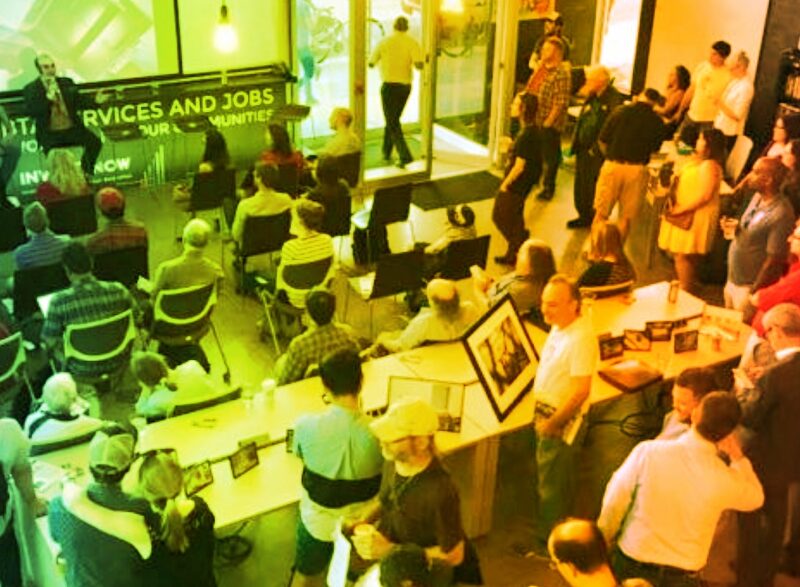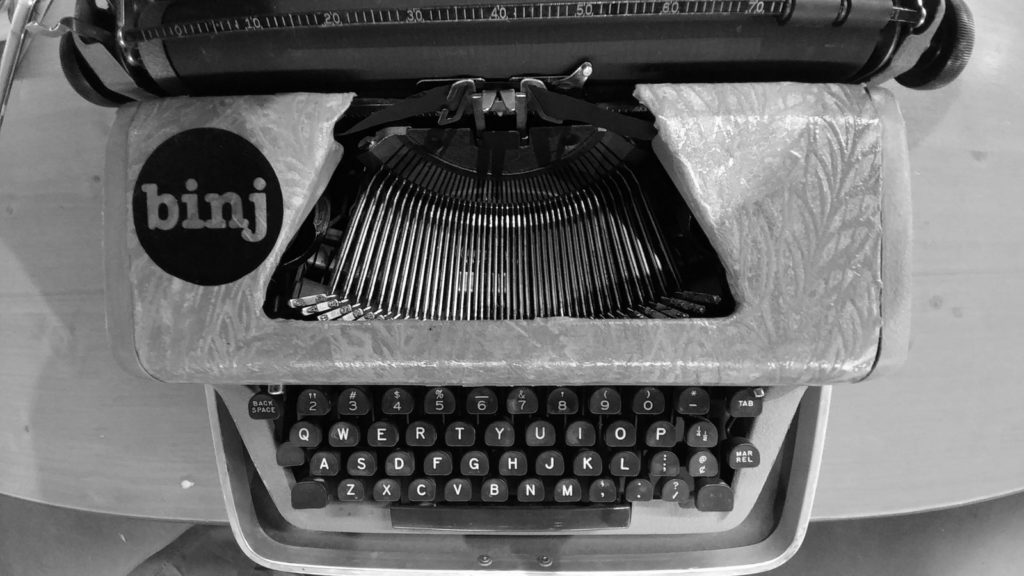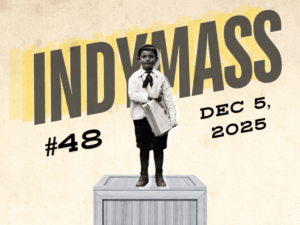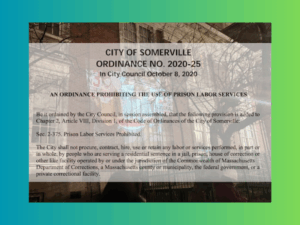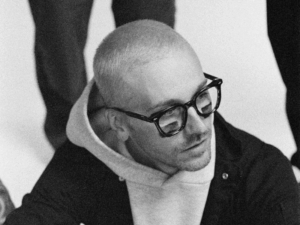A public conversation about transit infrastructure
As regular Dig readers couldn’t have possibly missed, along with the Boston Institute for Nonprofit Journalism (BINJ) we asked ace photographer Derek Kouyoumjian to spend a month snapping pics of utterly dilapidated MBTA tracks, stations, and trains. His images of so much beautiful decay, meant to scare the crap out of you and perhaps even spur a few riders into action, appeared as a photo essay titled #CONDEMBTA, and was followed up with a public event, discussion, and art show at Workbar Cambridge.
What transpired during the Workbar panel, which was sponsored by the INVESTNOW coalition of T labor and advocacy groups, was a rare conversation that cut to the heart of these regional issues. Hardly a venue for the opinions of transit officials and privatization proponents, whose opinions are already heard in the creaks and screams of trains that should have been removed from service years ago, the event was a platform for perspectives that are typically shut out of the mainstream—particularly those of T workers, T activists and advocates, and of course people like you, T riders. Here are some highlights …
ON OLD EQUIPMENT
John Doherty (Organizer with INVESTNOW): The T is grossly underfunded. There’s been divestment that’s been going on for years and years that has basically brought it to where it is. You have 15 different models of trains that go back 70 years that are being worked on… In order to bring a more modern and reliable service, there needs to be investment in the MBTA. The workers who are performing those jobs need better tools, better access to technology, and they’ll be able to provide a more sustainable MBTA.
Derek Kouyoumjian (#CONDEMBTA photographer): What really hit me was seeing things like the Central Square station [in that light]. I can remember when it was very dim, and dark. It was a very dismal-looking train station, and in the late-’80s they renovated it and made it very spiffy and cute and they extended the platform to accommodate six train cars. And it looked great. And now you see it all corroding away.
ON PRIVATIZATION
Doherty: Privatization was always a factor. If [the state] could provide as good or better service with no cuts to jobs, then they could pursue [private contracts]. Every [example of such] outsourcing so far has been a disaster. Look at the janitorial workers, who ended up having their hours cut, and ultimately having wages cut. These companies come in and show you numbers that you want to see, often through consultants who end up getting the contracts.
Louise Baxter (Organizer with T Riders Union): We want to save the middle class jobs, and [state government] wants to sell off the T to private industries. We’re fighting to keep what we have, but there’s a traffic problem, there’s a parking problem.

ON HAVES AND HAVE-NOTS
Doherty: The MBTA could be an economic driver. It’s important that we keep it reliable. Look who benefits—there are tons of corporations that benefit from having their workers use the MBTA. You look at cities and you see luxury developments getting put up while some people are getting pushed out farther and farther, driving the socioeconomic divide. Those people need to get to work. If they can’t get to work, they can’t pay taxes, and they can’t put food on the table. We need something that doesn’t just benefit the well-off areas… All you have to do is look at the Orange Line and the Red Line and you can see where money is being spent and where it isn’t being spent. All you have to do is drive around the different neighborhoods.
Suren Moodliar (Coordinator at encuentro5): New Balance gets a new station just because they’re New Balance. Right now in Lynn there’s a plan near the River Works, which is [the formerly private GE station] being turned into a public station [because of an adjacent development project]. The same thing with Suffolk Downs and the Revere Beach station, and with Assembly Square. It’s literally pay to play.
ON LABOR
George Mokray (Cambridge resident and clean energy advocate): We ride the T. They work the T. I know this guy who works like a dog, hours at night when the T isn’t running. The maintenance workers are the ones who are going to get hurt, who are going to get killed before the riders do. So what is the relationship between the pictures that [Derek] took and the unions, and the issues? Because those guys and gals know that the stuff is wrong, and they have to fix it, and they’ve been working with 20 to 30 years of deferred maintenance.
Doherty: I talk to a lot of the machinists. A lot of the parts they’re working with are 70 years old. They don’t even make them anymore. As for outsourcing, they’re not going to get any machinists who know how to work on 15 different models of trains [from the past] 70 years. They have to fabricate a lot of those parts, [and management is] talking about using the same machinists who are there right now, but for substantially less money.

ON CAPITAL IMPROVEMENTS
Tommy Vitolo (Brookline Town Meeting member): With $7.3 billion in backlogged capital projects, there are two problems: one is convincing the Commonwealth to find the money, that’s a problem, but the second problem is: can we spend that money well? Do we believe that the MBTA, if it started receiving that money, could spend it on capital projects that we believe can be done well? Because if we don’t believe that, we’re not going to find the money. And also, if we don’t believe that, maybe we should wait before we find the money. And so this is this question I don’t know how to answer. Can the MBTA spend that kind of money on backlogged projects in a way that is sensible and responsible?
Tim Lasker (MBTA sustainability specialist, OPEIU Local 453 union president): You can’t manage that kind of process when you have your sixth GM in five years. We don’t have consistency. We have international consulting agencies that are raping and pillaging our funds. I’m talking about construction projects—a fine example is Union Square over in Somerville… you have two or three holes in the ground. For $400 million? If anybody ever did any sort of audit on that they would see that 80 to 90 percent of it was put together to pay off consultants. And it went nowhere, because it was mismanaged.
Ingenuity comes from necessity… We’re working with trains that go back 40, 50, 80 years. I am sick and tired of hearing [workers] being blamed for the problem when they [MBTA administrators] don’t run it like a real company.
ON SOLUTIONS
Saul Schlapik (Brookline resident): It’s one thing to talk about [transportation infrastructure], but it would be very difficult to make any real changes—especially with the current [Gov. Charlie Baker] administration.
John Businger (Public transportation advocate and former state representative): I’m the guy who started the advocacy for connecting North Station and South Station… I am a member of the Regional Transportation Advisory Council, and we believe in connecting rail corridors across the country.
[People should] not only attend [MBTA control board] meetings, you should attend many of them. Don’t go away, don’t just do it one time. The people in power are going to be there every day and you’re not. I don’t want to discourage anybody, I just want to show you what you’re up against. A lot of these meetings are really run by the hierarchy. So don’t go away—say it once, say it twice, say it four times, because it will go down the drain unless they think you’re down for the long haul.

